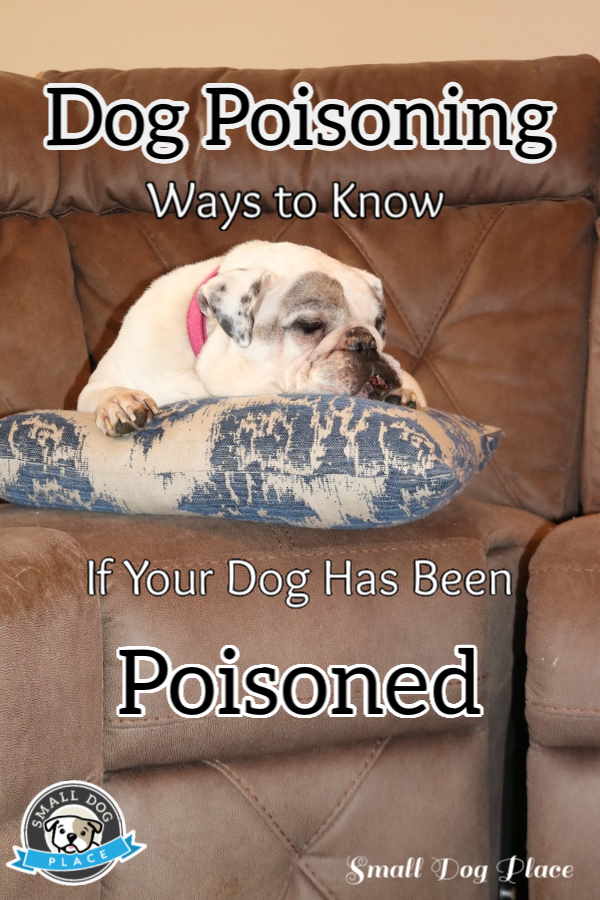- Small Dog Place Home
- Safety
- Dog Poisoning
Dog Poisoning:
4 Ways to Know if Your Dog Has Been Poisoned
Dog Poisoning by Carolina Martel |Last Updated 12-19-2022
Accidental dog poisoning is a common and frequent threat that pet owners have to worry about. It is a common threat because many household items and human foods can be poisonous for your dog.
Most responsible pet owners are careful about the placement of such products. They make sure that chemicals, foods, and other household items that are dangerous for their dog are placed out of their reach.
However, accidents happen, your dog may get into some chocolate that you have thrown in the trash, or it may eat some flowers or plants from the garden they prove to be poisonous.
 Dog Poisoning can be a serious threat to your dog.
Dog Poisoning can be a serious threat to your dog.Understanding the symptoms of poisoning and learning some first aid tips can help you take care of your beloved pet and even save their life. Depending on the kind of poisonous materials your dog has ingested, it could have very little time, and a quick response from you can make a lot of difference.
If your dog has ingested something poisonous, you need to take it to the vet immediately; however, if you know some first aid tips, you can make it easier for the vet to identify what kind of poisonous materials the dog has eaten and how to treat it.
Moreover, if you aren't able to get to a vet immediately, knowing a thing or two about caring for poisoned dogs can be quite helpful.
Therefore, today I am going to tell you some of the prevalent risk factors of dog poisoning and four practical ways in which you can help your dog if it has been poisoned, so keep reading to learn more.
What are the Risk Factors That Contribute To Pet Poisoning?
Dogs are the most common pet in the US, and according to statistics, 39% of US households have at least one pet dog. Though people care for their pets, and their home environment is quite favorable for them, it is also one of the more prominent sources of toxicological risks.
Dogs have an inquisitive nature, and they tend to explore, which often puts them at the risk of accidental poisoning from simple household items.
Recently a study was conducted with the Kansas State Veterinary Diagnostic Laboratory. In this study, the data for the calls over three years (from 2009-2012) was analyzed to determine what was the average risk factor for dogs being poisoned.
Out of the 1,616 total calls, 84.7% were regarding pet dogs, and the most common form of exposure was oral, which accounted for 95.5% of the total requests. Moreover, dermal exposure accounted for 3.7% and inhalation exposure for 0.6% of the calls.
Determine Whether Your Dog Has Been Poisoned
If you are going to help your dog, identifying their symptoms and the items that may have caused the poisoning is essential. Various symptoms can indicate that your pet might have ingested or inhaled something poisonous.
However, these symptoms vary a lot, and even if some of them are present, you can't be sure if your dog is poisoned or what kind of poisonous materials it has taken. The common symptoms of dog poisoning may include but aren’t limited to the following.
Symptoms of Dog Poisoning
- Vomiting
- Trouble in breathing
- Excessive coughing or sneezing
- Hyperactivity
- Tremors and seizures
- Fever
- Abnormal heart rate
If any of these symptoms are noticed, you should try to figure out what might have poisoned your dog. This can be helpful in its treatment and can even save its life. Here are some things that you should check out.
Make Sure Human Medications are Not the Cause of Dog Poisoning
 Dog Poisoning can occur quickly if your pet ingests certain human medications.
Dog Poisoning can occur quickly if your pet ingests certain human medications.Many human medications are seriously harmful to dogs. Here are some things you need to watch out for.
- Pain medications like, ibuprofen and acetaminophen
- Stomach medications like Kaopectate and Pepto Bismol can be harmful in the wrong dose. Most stomach problems can be fixed by using CBD for dogs, which is a great natural alternative.
- Decongestants like cold and flu product that contains pseudoephedrine
- Certain creams and ointments can be dangerous even in small amounts.
- Prescription medications like antidepressants and anti-cancer medication
Check Your Bathroom
 Bathrooms contain many chemicals that can cause accidental dog poisoning.
Bathrooms contain many chemicals that can cause accidental dog poisoning.Many things in the bathroom can also be potentially harmful to your dog. Here are the things you need to be careful about
- Petroleum jelly can cause diarrhea in dogs.
- Mouthwash and Scented candles can also cause poisoning.
- Ingesting soap can cause vomiting.
- Human toothpaste contains xylitol which is toxic for dogs.
Check Whether Your Dog Has Gotten Into any Household Cleaners or Products
Household items like cleaning products can also cause poisoning, and skin irritation; moreover, essential oils can also be harmful if ingested by your dog. Therefore, make sure that all cleaning products are inaccessible to your dog.
Tobacco can also be harmful to dogs; therefore, if you smoke, make sure to dispose of your cigarette butts responsibly. Vaping can also be dangerous.
Did Your Dog Eat any Foods that are Toxic to Dogs
 Chocolate is just one food that is toxic to dogs.
Chocolate is just one food that is toxic to dogs.Many human foods are completely safe and healthy for dogs but not all foods we love to eat are good for dogs.
Make sure that harmful food items like chocolate, avocados, raisins grapes, and nuts are away from the reach of the dog. View a complete list of foods that dogs should not eat.
Did Your Dog Sample Some of Your Houseplants or Chomp on Plants in Your Garden?
 Hosta plants are common in gardens and cause dog poisoning if ingested.
Hosta plants are common in gardens and cause dog poisoning if ingested.Puppies are notorious for checking everything out by taking a mouthful. While most plants taste bitter and adult dogs rarely choose to eat them, there are some plants that are especially harmful to dogs.
If your dog has access to indoor plants or plays in your garden regularly, them may decide to see if that lovely green leaf or colorful flower is good enough to eat.
Keep all poisonous plants away from dogs. View a list of plants toxic to dogs.
Seek professional help if You Suspect Your Dog Has Been Poisoned
When your pet dog is accidentally poisoned, it is widespread for people to get scared and start panicking. Most people don't know what to do to help their dog, and the best thing to do in this state is to seek professional help. Here are some ways in which you can do so.
Call Your Vet
 It's important to call your vet if you suspect dog poisoning.
It's important to call your vet if you suspect dog poisoning.If you suspect that your dog has ingested something harmful, you should call your vet and explain its symptoms. This can help you identify what might have caused the poisoning, and if your pet needs immediate medical attention.
Furthermore, if your dog is showing severe symptoms, then calling your vet. At the same time, you are headed in the direction that can help them prepare, and save a lot of valuable time.
If your regular vet clinic is closed, you should take your pet to a 24-hour emergency animal care facility, and if you can identify the cause of the poisoning, bring a sample with you. This can help the vet determine the proper treatment.
Call the Animal Poison Control Center
Aside from your vet, the best source of information regarding the health of your dog is the APCC is the best source of information. If you live in the US, the number for the ASPCA poison control helpline is (888)-426-4435.
Make Your Dog Vomit
If you catch your dog eating something that could be harmful to it, a very useful first aid tip is to make your dog vomit. Inducing vomit can help you ensure that the potentially poisonous substance won't harm your pet. However, there are some things you need to be careful about.
- Inducing vomiting might not be the best strategy if your dog has ingested a caustic substance, like bleach or an acidic substance like battery acid. Petroleum products can also cause more harm if you induce vomit.
- If your dog is having trouble in breathing, experiencing seizures, unconscious or has a prolonged heart rate than do not induce vomit,
- If you aren't sure, contact your vet and ask them if inducing vomit is good for the dog.
How to induce vomit in your dog
If you are confident that vomiting won’t harm your dog, or you have been directed by your vet to do so, you can quickly get the job done with an equal parts solution of 3% hydrogen peroxide and water. Here are some instructions you should follow.
- To evaluate the proper dose for the solution, you should go for 5 cc or ml or one teaspoon for every 10 pounds of your dog’s body weight.
- You can use a turkey baster to administer the solution if you don't have a syringe or dropper.
- Keep giving the same dose to the dog every fifteen minutes, until the dog starts vomiting; however, do not exceed three doses.
- Use an unopened bottle of hydrogen peroxide for better results
- If you don't have any hydrogen peroxide at home, dropping some table salt to the back of your dog's throat can also work.
- Even after the dog has vomited, you should take it to a vet, and bring along a sample of the vomit to help the vet identify the problem.
Dog Poisoning:
Quick Antidote to Induce Vomiting
- Equal Parts 3 % Hydrogen Peroxide & Water
- 5 cc/10 pounds of body weight given every 15 minutes for a total of 3 doses, or Until dog starts to vomit.
- Do not exceed 3 doses
Pay attention to the recovery of your dog
If your dog gets poisoned, there is going to be some recovery time as it regains its energy. In some cases where the poisoning isn't that severe, the dog may get active and happy within a day. However, in that case of severe poisoning, especially in cases where the vet may have had to flush the dog’s stomach, recovery can be a difficult time.
Intense poisoning can affect your pet’s liver and kidneys; therefore, you should make sure that they are getting a healthy diet, which has natural antioxidants and supplements that are beneficial for the dog’s organs.
You may also have to give your pet some medications after a poisoning incident, and that can be difficult when it is already scared or startled, therefore, look for some creative ways to get your dog to take its medication. Hiding the pills in some doggy treats can be an effective solution.
Pin for Future Reference
Final Thoughts
To sum it all up, we are responsible for our pets, and they can’t understand that certain things might be bad for them; therefore, it is up to us to prevent pet poisoning.
On the off chance that it does accidentally happen, we should stay calm and try to help our pets. I have mentioned some tips in this post, and I hope that it is helpful and informative.
Author’s bio: Dog Poisoning
Currently a student of English Literature, in her final years, Carolina Martel is passionate about writing her thoughts in words. She takes up writing projects in her leisure time to accompany her studies.
Generally, she understands the essence of writing on every topic but especially those that relate to her field. She regularly writes at https://shadedco.com/.
About Janice (author and voice behind this site)
Having lived with dogs and cats most of her life, Janice served as a veterinary technician for ten years in Maryland and twelve years as a Shih Tzu dog breeder in Ohio.
Her education includes undergraduate degrees in Psychology with a minor in biology, Early Childhood Education, and Nursing, and a master's in Mental Health Counseling.
She is a lifelong learner, a dog lover, and passionate about the welfare of animals. Her favorite breed for over 50 years has been the Shih Tzu, but she has also lived with Poodles, Maltese, Yorkshire Terriers, Beagles, English Bulldogs, Carin Terriers, and a Cocker Spaniel.
When not writing, reading, and researching dog-related topics, she likes to spend time with her eight Shih Tzu dogs, husband, and family, as well as knitting and crocheting. She is also the voice behind Miracle Shih Tzu and Smart-Knit-Crocheting
Does This Article Deserve Your Thumbs Up?
We always appreciate your support and encouragement. Your thumbs up means so much to us. Please like this article.
If you find this page or any page on Small Dog Place Helpful, or useful in anyway, I'd love it if you would click the small heart found on the bottom right of each page.
You can also share or bookmark this page -- just click on the:

Free Monthly Newsletter
Sign Up for Our Free Newsletter and get our Free Gift to You.
my E-book, The Top 10 Mistakes People Make When Choosing a Dog (and how to avoid them)










